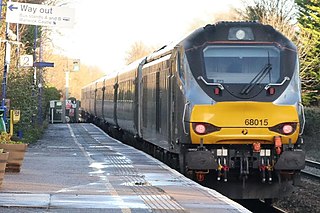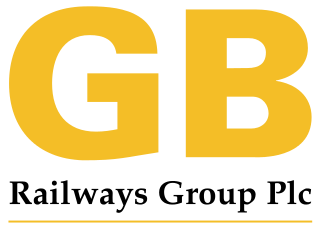Related Research Articles

The railway system in Great Britain is the oldest railway system in the world. The first locomotive-hauled public railway opened in 1825, which was followed by an era of rapid expansion. Most of the track is managed by Network Rail, which in 2017 had a network of 9,824 miles (15,811 km) of standard-gauge lines, of which 3,339 miles (5,374 km) were electrified. These lines range from single to quadruple track or more. In addition, some cities have separate metro, light rail and tram systems. There are also many private railways, which are primarily short lines for tourists. The main rail network is connected with that of continental Europe by the Channel Tunnel and High Speed 1, which fully opened in 1994 and 2007 respectively.

Anglia Railways was a train operating company in England, owned by GB Railways and later FirstGroup, that operated the Anglia franchise from January 1997 until March 2004.

Arriva Trains Northern was a train operating company in England owned by Arriva that operated the Regional Railways North East franchise from March 1997 until December 2004. Arriva resumed operating Northern train services again on 1 April 2016 under the Northern brand but ceased again on 29 February 2020.

Thames Trains was a train operating company in the United Kingdom owned by Go-Ahead Group, which operated the Thames Trains franchise from October 1996 until March 2004.

Virgin Trains (VT) was a train operating company in the United Kingdom owned by Virgin Rail Group, a joint venture between Virgin Group and Stagecoach, which operated the InterCity West Coast franchise from 9 March 1997 to 7 December 2019. The franchise covered long-distance passenger services on the West Coast Main Line between London, the West Midlands, North West England, North Wales and southern Scotland, consequently connecting six of the UK's largest cities: London, Birmingham, Manchester, Liverpool, Glasgow and Edinburgh, which have a combined metropolitan population of over 18 million. Virgin Trains had around 3,400 employees in 2015.

Chiltern Railways is a British train operating company that has operated the Chiltern Railways franchise since July 1996. Since 2009, it has been a subsidiary of Arriva UK Trains.

West Anglia Great Northern, commonly shortened to WAGN, was a train operating company in England. It operated the West Anglia Great Northern franchise between January 1997 and March 2004, as well as the Great Northern franchise between April 2004 and March 2006. It was initially owned by Prism Rail, and was subsequently acquired by the British transport conglomerate National Express.

DB Cargo UK, is a British rail freight company headquartered in Doncaster, England.
The privatisation of British Rail was the process by which ownership and operation of the railways of Great Britain passed from government control into private hands. Begun in 1994, the process was largely completed by 1997. The deregulation of the industry was in part motivated by the enactment of EU Directive 91/440 in 1991, which aimed to create a more efficient railway network by creating greater competition.

Great Western Railway (GWR) is a British train operating company owned by FirstGroup that operates the Greater Western passenger railway franchise. It manages 197 stations and its trains call at over 270. GWR operates long-distance inter-city services along the Great Western Main Line to and from the West of England and South Wales, inter-city services from London to the West Country via the Reading–Taunton line, and the Night Riviera sleeper service between London and Penzance. It provides outer-suburban services in West London; commuter services from its London terminus at Paddington to the Thames Valley region, including parts of Berkshire and Buckinghamshire, and Oxfordshire; and regional services throughout the West of England and South Wales to the South coast of England. Great Western Railway provides and maintains the Electrostar Class 387 fleet for Heathrow Express.
FirstGroup plc is a British multi-national transport group, which is based in Aberdeen in the north-east of Scotland. The company operates transport services in the United Kingdom and the Republic of Ireland. It is listed on the London Stock Exchange and is a constituent of the FTSE 250 Index.
A train operating company (TOC) is the term used on the railway system of Great Britain for a railway undertaking operating passenger trains under the collective National Rail brand. TOCs have existed since the privatisation of the network under the Railways Act 1993.
Stagecoach Group is a transport group based in Perth, Scotland. It operates buses, express coaches and a tram service in the United Kingdom.

Virgin CrossCountry was a train operating company in the United Kingdom that operated the InterCity CrossCountry passenger franchise from January 1997 until November 2007. Along with the InterCity West Coast franchise held by a separate legal entity, the company traded under the Virgin Trains brand.

First North Western was a train operating company in England owned by FirstGroup that operated the North West Regional Railways franchise from March 1997 until December 2004.
Govia is a transport company based in the United Kingdom. It was formed in November 1996 as a joint venture between Go-Ahead Group (65%) and Keolis (35%) to bid for rail franchises during the privatisation of British Rail.

Passenger rail franchising in Great Britain is the system of contracting the operation of the passenger services on the railways of Great Britain to private companies, which has been in effect since 1996 and was greatly altered in 2020, with rail franchising being effectively abolished in May 2021.

GB Railways was the parent company of a number of train operating companies, running the Anglia Railways franchise from January 1997 and launching Hull Trains and GB Railfreight. GB Railways was also involved in the management of the Estonian rail company Edelaraudtee and had an investment in Great Southern Rail in Australia.

The impact of the privatisation of British Rail has been the subject of much debate, with the stated benefits including improved customer service, and more investment; and stated drawbacks including higher fares, lower punctuality and increased rail subsidies. The privatisation of British Rail began in the 1990s.
Great British Railways (GBR) is a proposed state-owned public body that is to oversee rail transport in Great Britain except for Transport for London, Merseytravel, light rail and tram services. It is to assume most rail functions of the Department for Transport (DfT) and the Rail Delivery Group, including procuring services and setting fares. In addition, it is to absorb Network Rail to become the operator of most rail infrastructure across Great Britain. It will not affect the existing powers of the UK's devolved administrations in their areas.
References
- ↑ Companies House extract company no 2996875 Great Western Holdings Limited
- ↑ The passenger train The Guardian 20 September 1997
- ↑ Railway Organisations Research Paper 99/80 House of Commons Library 20 September 1999
- ↑ No Headline The Independent 31 January 1997
- ↑ Railway Organisations Research Paper 99/80 House of Commons Library 20 September 1999
- ↑ "Great Western set to win North West franchise". Rail Magazine . No. 298. 12 February 1997. p. 7.
- ↑ Rail bosses cash in on privatised gravy train The Independent 7 March 1998
- ↑ FirstGroup Annual Report 31 March 1999 Archived 13 February 2009 at the UK Web Archive